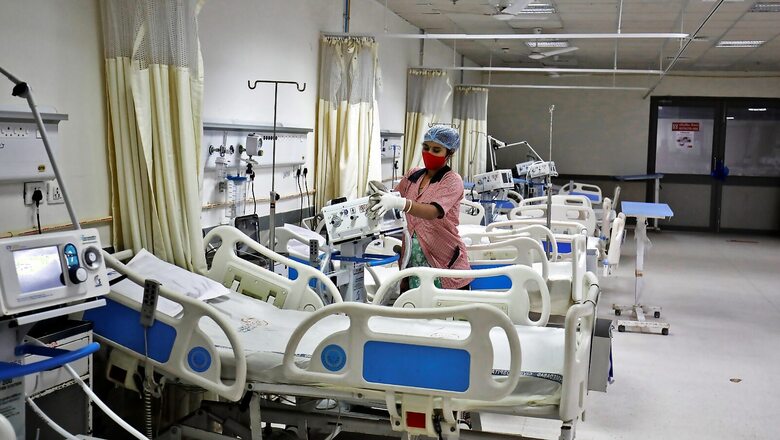
views
The country’s universal health insurance scheme, Ayushman Bharat, does not cover the genuine cost of hospitals giving high quality care, Dr Sangita Reddy, joint managing director at Apollo Hospitals, said on Monday.
Apollo Hospitals is India’s largest healthcare chain but no longer participates in the scheme considering the allegedly faulty pricing structure for hospitals. The hospital is working with the government and other players to work out a reasonable pricing structure for hospitals empanelled under the scheme.
Ayushman Bharat, a flagship scheme, was launched by the central government, as recommended by the National Health Policy 2017, to achieve the vision of universal health coverage.
As part of the Ayushman Bharat-Pradhan Mantri Jan Arogya Yojana (PM-JAY), an eligible family is provided Rs 5 lakh per year for secondary and tertiary care hospitalisation across public and private empanelled hospitals in India.
“The rate of inflation in India hovers around 6 to 8% whereas healthcare inflation is typically 3% higher than the general inflation,” Reddy said. “Yet, the prices under the scheme paid to hospitals have not been revised accordingly, though there have been small tweaks undertaken by the government.”
“If one conducts a scientific study considering the high quality care, the scheme does not cover the genuine costs. Large hospitals like us will not be able to continue,” she added.
Reddy further said that treatments worth certain amounts can be done as part of corporate social responsibility, but on a scale, she said, the larger hospitals won’t be able to do it.
Good news is that the government is now reviewing the standard price structure, she added.
“The Health Ministry and Health Secretary have promised us. We have submitted our data along with FICCI, NATHEALTH and others. They are working on building acceptable standards.”
“While Ayushman Bharat focuses on the bottom 400 million people, among the recommendations, we have suggested that there are another 400 million people who will be very happy to pay for affordable healthcare,” Dr Reddy said.
“The middle class. There also we can help. We can build a system which works at a price point which is affordable and caters to them.”
‘Non-Communicable Diseases Biggest Pandemic’
The biggest pandemic in the world is not Covid-19, but non-communicable diseases, Dr Reddy said.
According to her, non-communicable diseases, mostly triggered by lifestyle-related disorders, such as cancer, diabetes, heart disease or obesity do not change by spending 15 minutes with doctors or by taking tablets.
Calling it the next big thing in healthcare, Reddy spoke about Apollo Hospitals’ latest initiative of launching a new tool called ‘Clinical Intelligence Engine’ for doctors which will assist them in taking precise clinical decisions.
“Non-communicable diseases only change by completely modifying lifestyle and when you have a coach, that too in your mobile phones, the shift is that it’s no longer doctor-centric care. From doctor-centric care, it is moving into specialities such as dieticians, physicians, yoga teachers, physiotherapists,” she said.
“Now at the centre of healthcare is the individual who is empowered by knowledge, data and artificial intelligence.”
With the health information exchange system coming in, recyclable data can be mined and using the power of Artificial Intelligence, we can begin to analyze big health trends, she said.
“Deciphering data can give insights into things like why Manipur is getting more tongue cancer, why one area is finding more abdomen cancer cases, outbreak due to contaminated water and much more.”
Health maps with hotspots will emerge from such data and proactive planning systems can be put in place for weak areas of healthcare.
“Alongside, powerful public private unification will emerge as we did during Covid-19 via CoWin where a system guided people over public and private availability of vaccines,” she added.
Apollo, she said, has requested the government, including Niti Aayog and National Health Authority, to come up with a system of unifying public and private healthcare using technology.
‘No One Immune to Cyber Attacks’
The CIE is developed using artificial intelligence and machine learning using millions of clinical data points from Apollo’s clinical knowledge base and real world clinical data. The data used on the app has been registered with due consent which complies to international norms.
With latest cyberattacks on AIIMS and Safdarjung Hospitals, Apollo said it has six engineers monitoring all servers round-the-clock.
“We keep refreshing firewalls and monitoring the attacks. By god’s grace and a lot of good work by our engineering teams, we have been safe so far… We have backup databases stored on the cloud and we have an archival and retrieval system. We have been careful but I don’t think any company in the world can say they are immune to cyberattacks.”
Read all the Latest India News here


















Comments
0 comment